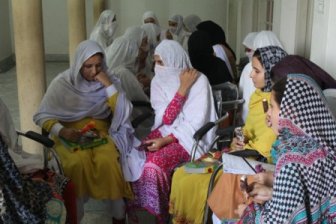 In a stunning story of survival and recovery, the Pakistani teenager whom Taliban gunman shot in the head in October has been released from a hospital.
In a stunning story of survival and recovery, the Pakistani teenager whom Taliban gunman shot in the head in October has been released from a hospital.
Malala Yousufzai left Queen Elizabeth Hospital in Birmingham, England, on Friday. In the past two weeks, the girl famous for advocating that girls in Pakistan be educated -- which stoked the ire of her attackers -- proved her incredible strength by enduring two operations to repair her skull and restore her hearing.
The gunfire caused swelling in Malala's skull and a break in the delicate bones that help turn sound into sensory impulses to her brain.
"God has given me this new life," she recently said, speaking for the first time on camera since the shooting. "I want to serve the people. I want every girl, every child, to be educated."
Though the gunshots to her neck and head made many doubt that she would walk again, Malala continued to improve over the past several months.
"I can walk a little bit and I'm feeling better," the 15-year-old said on February 6.
At that time, she said she hoped to be fully recovered in a month.
Her medical team decided she was well enough to be discharged Thursday. The teen will continue her rehabilitation at her family's temporary home in Birmingham and will visit the hospital occasionally for outpatient appointments.
Malala has credited her survival to "the prayers of the people."
Her story captured worldwide attention, moving Pakistan to vow that it would more vigorously fight for girls' rights and against the Taliban. It also prompted global leaders to put pressure on the country to make good on those promises.
"Because of these prayers, God has given me this new life and I want to serve and I want every girl, every child to be educated," she said.
Malala has already started talking about furthering the cause that enraged the Taliban. In 2009, she wrote an extraordinary blog published by the BBC about how she wanted to go to school but was afraid.
"The Taliban have repeatedly targeted schools in Swat," she wrote.
About that time, the Taliban issued a formal edict, which covered her home in Pakistan's Swat Valley, banning all girls from schools. On the blog, Malala praised her father, who was operating one of the few schools that would go on to defy that order.
"My father said that some days ago someone brought the printout of this diary saying how wonderful it was," she wrote. "My father said that he smiled, but could not even say that it was written by his daughter."
Malala soon garnered international attention. She started giving interviews with news outlets, including CNN.
"I have the right of education," she said in a 2011 interview with CNN. "I have the right to play. I have the right to sing. I have the right to talk. I have the right to go to market. I have the right to speak up."
Why do you risk your life to raise your voice? a reporter asked her.
In perfect English, she answered that her people need her.
"I shall raise my voice," she insisted.
"If I didn't do it, who would?" she said.
Girls who are scared should fight their fear, she said.
"Don't sit in your bedrooms.
"God will ask you on the day of judgment, 'Where were you when your people were asking you ... when your school fellows were asking you and when your school was asking you ...'Why I am being blown up?' "
On October 9, Taliban assassins attacked a van that carried Malala and other schoolchildren. They demanded that the children identify her.
Terrified, the children did it, and the men fired, wounding two other girls in addition to hitting Malala.
"We do not tolerate people like Malala speaking against us," a Taliban spokesman later said, as Malala, in a Pakistani hospital, breathed with the help of a ventilator.
The Taliban vowed that if Malala survived, they would come after her again.
Portland and Seattle
Free Subscription to Breaking News
Free Subscription to Breaking News





















































































































































































































































































































































